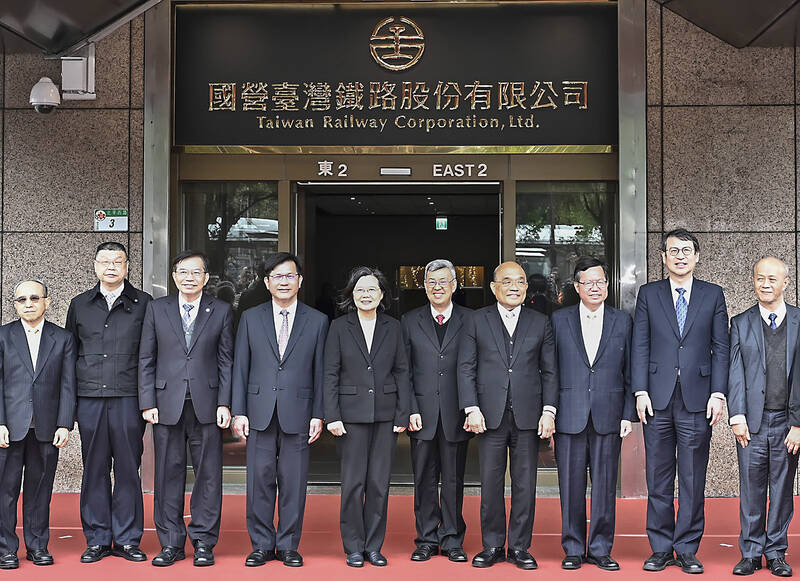The Taiwan Railways Administration (TRA) yesterday officially became the state-run Taiwan Railway Corp (TRC), with the management of the newly established firm vowing to provide a safe and efficient service.
President Tsai Ing-wen (蔡英文), Premier Chen Chien-jen (陳建仁), former premier Su Tseng-chang (蘇貞昌), Minister of Transportation and Communications Wang Kwo-tsai (王國材) and other officials attended the inauguration ceremony, unveiling the new sign for the nation’s oldest and largest railway system, which has been in operation since 1887.
Tsai said that TRA carried a heavy financial burden because it was charged to operate many unprofitable routes, adding that the significant amount of pension fund contributions that had to be distributed to TRA employees as well as the agency’s asset management added further economic expenses.

Photo: Chen Chih-chu, Taipei Times
The plan to corporatize the railway agency was proposed in 2002 and was scheduled to be completed in 2004, but it did not materialize until after two major fatal derailments in 2018 and 2021, which convinced the public that a comprehensive reform at the agency was necessary.
“It took more than 20 years for the TRA to become a state-run railway corporation. The government had been trying to find the best solutions to minimize the impact of the systematic change on workers while reforming the agency to ensure a safe and stable operation,” Tsai said.
“We thank the families of victims for helping the railway agency transform into a state-run company and push for safety reform,” she said.
The government would continue to subsidize the railway firm to relieve its financial burden and help it develop its properties to ensure efficient, sustainable and safe operations, Tsai said.
TRC chairman Du Wei (杜微) said the company has to raise ticket prices, adding that the prices have not been adjusted for more than 20 years.
“We will make sure that safety and service issues are addressed first, but we begin studying
ticketing-related issues this year. We will also gauge the public’s attitude and suggestions before making any change,” Du said.
The TRA had accumulated a short-term debt of about NT$170 billion (US$5.5 billion), which would now be repaid by a fund established solely for the purpose of servicing the debt, Du added.
“The company now starts from square one. We will pay special attention to our financial
soundness… The company’s cash flow is projected to turn positive by 2026. As for the accounting, the financial statement is expected to turn from a loss to a profit in 2028 due to huge depreciation write-offs,” he said.
Du also said that the company has a staffing shortage of about 1,000 to 1,100 people, adding that the staff would soon be replenished with new employees recruited during the second half of next year.
New employees would undergo intensive educational training before they can officially be placed on duty, he said.
As the Taiwan Railway Union is scheduled to vote on whether to go on strike during the Lunar New Year holiday, Du said that the company would negotiate with the union as quickly as possible.

Taiwan has received more than US$70 million in royalties as of the end of last year from developing the F-16V jet as countries worldwide purchase or upgrade to this popular model, government and military officials said on Saturday. Taiwan funded the development of the F-16V jet and ended up the sole investor as other countries withdrew from the program. Now the F-16V is increasingly popular and countries must pay Taiwan a percentage in royalties when they purchase new F-16V aircraft or upgrade older F-16 models. The next five years are expected to be the peak for these royalties, with Taiwan potentially earning

STAY IN YOUR LANE: As the US and Israel attack Iran, the ministry has warned China not to overstep by including Taiwanese citizens in its evacuation orders The Ministry of Foreign Affairs (MOFA) yesterday rebuked a statement by China’s embassy in Israel that it would evacuate Taiwanese holders of Chinese travel documents from Israel amid the latter’s escalating conflict with Iran. Tensions have risen across the Middle East in the wake of US and Israeli airstrikes on Iran beginning Saturday. China subsequently issued an evacuation notice for its citizens. In a news release, the Chinese embassy in Israel said holders of “Taiwan compatriot permits (台胞證)” issued to Taiwanese nationals by Chinese authorities for travel to China — could register for evacuation to Egypt. In Taipei, the ministry yesterday said Taiwan

‘LIKE-MINDED PARTNER’: Tako van Popta said it would be inappropriate to delay signing the deal with Taiwan because of China, adding he would promote the issue Canadian senators have stressed Taiwan’s importance for international trade and expressed enthusiasm for ensuring the Taiwan-Canada trade cooperation framework agreement is implemented this year. Representative to Canada Harry Tseng (曾厚仁) in an interview with the Central News Agency (CNA) said he was increasingly uneasy about Ottawa’s delays in signing the agreement, especially as Ottawa has warmed toward Beijing. There are “no negotiations left. Not only [is it] initialed, we have three versions of the text ready: English, French and Mandarin,” Tseng said. “That tells you how close we are to the final signature.” Tseng said that he hoped Canadian Prime Minister Mark Carney

POSITIVE DEVELOPMENT: Japan and the US are expected to hold in-depth discussions on Taiwan-related issues during the meeting next month, Japanese sources said The holding of a Japan-US leaders’ meeting ahead of US President Donald Trump’s visit to China is positive news for Taiwan, former Japan-Taiwan Exchange Association representative Hiroyasu Izumi said yesterday. After the Liberal Democratic Party’s landslide victory in Japan’s House of Representatives election, Japanese Prime Minister Sanae Takaichi is scheduled to visit the US next month, where she is to meet with Trump ahead of the US president’s planned visit to China from March 31 to April 2 for a meeting with Chinese President Xi Jinping (習近平). Japan and the US are expected to hold in-depth discussions on Taiwan-related issues during the